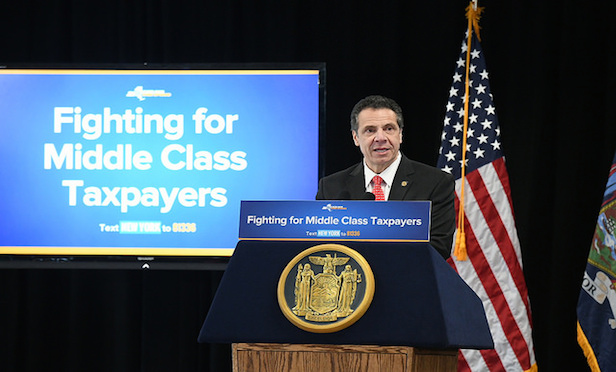
ELMSFORD, NY—Gov. Andrew Cuomo traveled to Westchester County on Tuesday to sign legislation geared to circumventing the tax increases imposed on New York State taxpayers from the federal tax reform bill passed earlier this year.
The governor ceremoniously signed the legislation included in the recently passed state budget on “Tax Day” at an event held at the International Brotherhood of Teamsters Local 456 headquarters in Elmsford. The legislation provides new options for tax deductible charitable donations, creates a new Employer Compensation Expense Program so employers can help their employees maximize deductibility, and decouples the state tax code from the federal tax code, where necessary, to avoid more than $1.5 billion in estimated state tax increases brought solely by increases in federal taxes, state officials say.
Gov. Cuomo also reiterated his contention that New York will join with New Jersey and Connecticut to sue the federal government over the tax impacts of the tax reform bill that caps state and local tax (SALT) deductions at $10,000. The governor and other officials that attended yesterday's bill signing noted that particular provision of the federal tax reform bill as particularly onerous on high cost areas, such as Westchester County for example. The governor pegged the federal tax reform bill's cost to New York State taxpayers at $14.3 billion.
“New York will not stand idle while the federal government takes aim at the economic heart of our communities and takes from the hardworking men and women of this state to benefit this country's wealthy and corporations,” Gov. Cuomo said. “This bill ensure protections for New Yorkers against Washington's targeted attack and we will continue to lead this fight and do everything we can to protect the rights and wallets of families across New York.”
Westchester County Executive George Latimer added, “In Westchester County most residents pay more than $10,000 a year in taxes. These taxes are for schools, local government and state government. The last federal budget robbed Westchester—and our resident's way of life was threatened. I want to thank Governor Cuomo for this creative plan to help county taxpayers, and Legislators for recognizing how imperative this issue is. We support it, and will do everything in our power to implement it.”
The state budget creates a new state-operated Charitable Contribution Fund to accept donations for the purposes of improving health care and public education in New York State. Taxpayers who itemize deductions may claim these charitable contributions as deductions on their federal and state tax returns. Any taxpayer making a donation may also claim a state tax credit equal to 85%of the donation amount for the tax year after the donation is made. Taxpayers may also make qualified contributions to certain not-for-profit organizations for specified purposes.
The FY 2019 state budget authorizes local governments to establish charitable gift reserve funds and to offer real property tax credits to incentivize contributions to these new local charitable funds. Under the law, such funds may receive unrestricted charitable contributions for addressing education, health care, and other charitable purposes. This is an optional program available to counties, cities, towns, villages and school districts. Local governments and school districts may also establish charitable funds and offer real property tax credits to incentivize contributions to these new local charitable funds, state officials said.
Another provision of the budget establishes an Alternative Employer Compensation Expense Program as a means for employers to help their employees with their federal tax bill. Under this program, employers will be able to opt-in to a new Employer Compensation Expense Program structure. Employers that opt-in will be subject to a 5% tax on all annual payroll expenses in excess of $40,000 per employee, phased in over three years beginning on Jan. 1, 2019. The progressive personal income tax system will remain in place, and a new tax credit corresponding in value to the ECEP will cut the personal income tax on wages and ensure that state filers subject to the ECEP will not experience a decline in take-home pay, according to state officials.
The program is designed to be revenue neutral for the state. Employers would also not be adversely impacted, but they'd be giving their employees the opportunity to reduce their federal taxes, they add.
© Touchpoint Markets, All Rights Reserved. Request academic re-use from www.copyright.com. All other uses, submit a request to [email protected]. For more inforrmation visit Asset & Logo Licensing.







